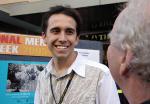Seeking help a healthy choice for men
 Public Health Public Health
Why don't more men go to the doctor? It's a simple question - but the answers are much more complex, according to the University of Adelaide's James Smith. Mr Smith is researching how and why men seek help from health professionals and services for his PhD with the University of Adelaide's Departments of Public Health and Medicine, supervised by Dr Annette Braunack-Mayer and Dr Megan Warin. For his qualitative study, he has already interviewed 36 men, asking them about their "help-seeking" behaviour, thanks to financial support from the Florey Medical Research Fund. His research also forms part of the large-scale Florey Adelaide Male Ageing Study being led by the University's Professor Gary Wittert, focusing on the health of some 1000 men from Adelaide's northwestern suburbs. "The health of men is far worse, in many instances, when compared with women, and part of the reason for that is the perception that men don't use health services as much as women," Mr Smith said. "It's one of those things that everyone has recognised for some time, but only recently has there been a real push to get men to use health services more often." So far in his research, Mr Smith has found that age and marital status play an important part in determining the patterns of how men seek help for their health. "Older men are likely to use health services differently than younger men: they are often on medication regimes and require repeat scripts, whereas younger men often wait until something is wrong before even considering going to the doctor," Mr Smith said. "Whether you are married or not is a factor, too. Men who are married perceive themselves to be healthier in general, but may also be 'guided' towards using health services by their spouses." In addition to conducting his PhD, Mr Smith also works part-time at the Royal Adelaide Hospital as a Health Promotion Officer. At the RAH, he coordinates Health In Men (HIM), an initiative which involves health screenings, referrals, and the provision of education in men's health for health professionals, students and the wider community. "My PhD and my work with the RAH are complementary," Mr Smith said. "For my PhD I'm taking a step sideways and analysing the problems with how men are seeking help for their health, and with the RAH I'm at the 'coalface', working closely with the men themselves. "I'd like to think that the work conducted through HIM will assist in addressing problems I've identified during my PhD. "Through HIM, we recognise that there are systematic barriers which prevent men from accessing health services: one is not knowing that they exist, and another is problems associated with accessing them after working hours.
"We actively try and help men learn what is available to them and how they can access it - or in other words, we try and facilitate greater dialogue between men and health services providers." Story by Ben Osborne
|





